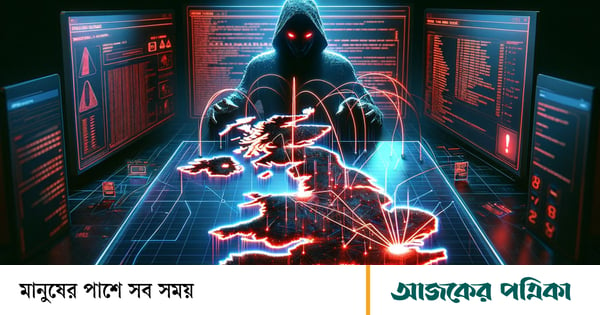Cyber attacks are on the rise in the UK. In 2024, there will be 16 percent more cyber crimes than last year, said the country's cyber security chief, Richard Hone. He also said that 430 cyber crimes have been investigated so far this year, compared to 371 last year. Critical infrastructures such as energy, water, transportation, health and telecommunications have become targets of ransomware attacks.
Richard Horne said in a warning on Tuesday that UK cyber crime has increased significantly. There has also been a change in style. Our adversaries are engaged in trying to destroy the cyber world by taking advantage of the development of technology.
NCSC is part of GCHQ, Britain's intelligence agency. According to a recent report by the agency, most of the reported cases of ransomware this year came from the education, manufacturing, IT, legal, charity and construction sectors. There were 347 incidents of unauthorized, confidential data transfer from computers or other devices, and 20 were due to ransomware. 542 cyber attack prevention and prevention tips have been given to various organizations. This number is more than double of last year (258).
According to the NCSC, cybercriminals cripple their target's IT systems. By stealing confidential data. They later demand a ransom in Bitcoin to return the stolen data. Recently, a cyber attack was carried out on the British Library and Synovis, a company responsible for blood tests in hospitals under the Department of Health.
Hackers can use artificial intelligence (AI) to launch more sophisticated cyber attacks, the cyber chief warned. We believe the severity of the attack risk is being greatly underestimated. No state or criminals can be complacent about the extent of the cyber attack threat.
The cyber chief also said cyber attacks in the UK had tripled due to Russia's 'aggressive and reckless behaviour' and China's use of 'highly advanced' technology. They cherish the ambition to influence other countries.
The NCSC report also warned that Iran was developing cyber capabilities to attack the UK. On the other hand, UK institutions are almost certainly becoming targets for North Korean workers. North Korean hackers are using cryptocurrencies to raise revenue and attempt to steal defense-related data to improve Pyongyang's internal security and military capabilities.
Last week, the country's cabinet minister, Pat McFadden, warned that Russia could shut down the UK's power grid through cyber attacks and leave millions of people in the dark. According to the UK's National Crime Agency, Russian cybercriminal group Evil Corp has launched attacks against NATO countries at the behest of the state's intelligence agency.
Horne, the head of cyber, warned UK public and private organisations: 'Since taking over the NCSC I have had to work hard – on the growing gap between the risks we face and our resilience. It's clear that we need to step up to stay ahead of our opponents.'
Richard Horne, head of the NCSC, cited the prevalence of cyber threats to UK businesses and government agencies as a 'strong warning'. Alan Woodward, professor of cyber security at the University of Surrey, said the NCSC was warning the public and private sector not to be 'careless'. The government is now trying to issue a strong warning. But it seems that not everyone is heeding this warning.

